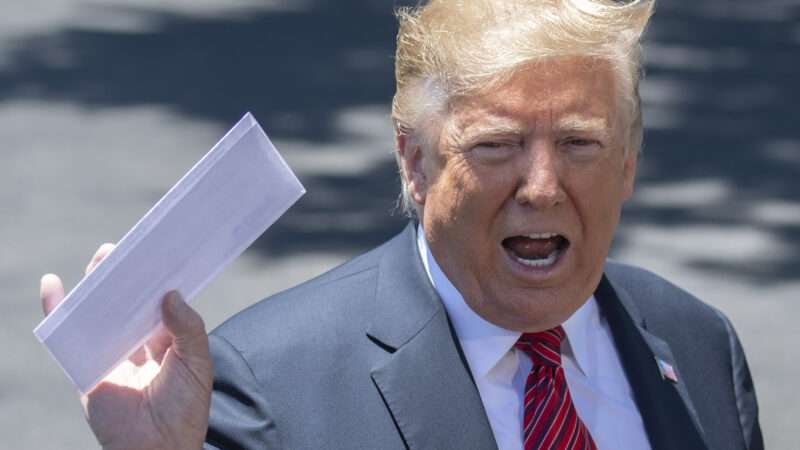
Tariff price shock absorbers: In 2019, the average price of a new car in America was less than $40,000. But in the years since the pandemic, prices of new vehicles have risen rapidly. As of October 2024, the average price of a new car was more than $47,000.
Incoming President Donald Trump's threatened tariffs could raise those prices by nearly $3,000, according to an estimate from Wolfe Research, since the cost of tariffs is likely to be passed on to consumers.
That estimated price hike would be a direct result of Trump's proposal to erect 25 percent tariffs on goods imported from Canada and Mexico. As The Wall Street Journal reports, the additional import taxes would hit low-priced vehicles especially hard, since many auto manufacturers have moved production of less expensive, low-profit-margin vehicles to Mexico.
Auto manufacturing labor in the United States is expensive, but it's considerably cheaper in Mexico, so vehicles that retail for less than $30,000 new—a rapidly disappearing segment of the market—would be hit hardest. (At this point, there's literally only one vehicle that retails for less than $20,000 new in the United States, the Nissan Versa.)
About a third of the cars priced less than $30,000 are built in Mexico, the Journal reports.
Trump spent much of his presidential campaign pounding Democrats generally and the Biden administration specifically for policies that contributed to skyrocketing inflation and high prices. So it's bitterly ironic that Trump's signature economic proposal, the imposition of new tariffs, would similarly contribute to higher prices.
On the campaign trail, Trump promised to bring auto manufacturing back to the U.S., saying that if elected, his presidency would herald "the launch of a new American industrial revolution." He promised to make interest on auto loans fully tax deductible, a plan that didn't make a whole lot of sense.
Trump made a lot of promises. We'll have to wait and see what he actually does.
But one of the few issues he's been consistent on over the years is opposition to foreign trade, which he seems to view as a zero-sum game in which Americans lose. Yet his trade proposals, if implemented, would almost certainly cost Americans a lot of money.
There's an obvious political lesson to be learned from the last few years: Americans hate high prices. Yet neither party seems to have learned that lesson. If there was a party simply committed to eliminating regulations, taxes, trade barriers, and so forth that artificially raise prices, I predict it would do very well.
Wassup, Superfund: Remember Superfund? (No, not Superfriends.) It's back, sort of. Only in New York!
Yesterday, New York Gov. Kathy Hochul signed the Climate Change Superfund Act into law. The act would force fossil fuel energy companies to pay into a fund to offset the cost of expensive weather damage. (A similar law was recently passed in Vermont.)
Many of the specifics are still TBD. As local news channel ABC 7 reports, "the state must come up with rules on how to identify responsible parties, notify companies of the fines and create a system to determine which infrastructure projects will be paid for by the fund." But according to The New York Times, the payments from affected companies would total about $3 billion a year for the next 25 years.
Would that, perhaps, raise prices for energy consumers?
The Times notes that "some economists" have suggested that because "fees are based on past emissions, and oil prices are set by a global market, future prices should not be affected." Uh, sure. It's only $3 billion in new costs for energy producers. Why would anyone think that would make a difference in the price of energy? Crazy talk!
South Korea vs. Presidents: For the second time in weeks, South Korean lawmakers have impeached the country's top political leader. The first impeachment was a result of President Yoon Suk Yeol's bizarre decision to impose martial law. After his ouster, Prime Minister Han Duck-soo became acting president. That didn't last long. He's now been impeached too.
What's next? As of this morning, no one really knows. But some observers have suggested that the country's unrest could take a long time to resolve. It's just one more element of uncertainty at a time of international instability.
Scenes from Washington, D.C.: President Joe Biden signed 50 (!) bills into law on Christmas Eve. According to CBS News: "The bills Mr. Biden signed include socialite and activist Paris Hilton's bill to protect teenagers living in residential treatment facilities, a bill setting anti-hazing standards on college campuses, and a bill preventing members of Congress from collecting pensions if convicted of certain crimes."
Quick Hits
- There are a whole lot of new laws going into effect in New York in 2025. Happy New Year?
- "The thing I've changed my mind most on in politics in recent years is how destructive bad regulations can be," says New York Times columnist Ezra Klein.
- MAGA types and pro-Trump tech types spent Christmas arguing about high-skilled immigration.
- Americans are not feeling super stoked about America. Sad!
- Trump's incoming border czar says he will move back to family detention.
- Are influencers taking over politics?
- At this point, the question you have to ask is…what can't you make a knife out of?
The post Make Cars (and Everything Else) Cheap Again appeared first on Reason.com.







